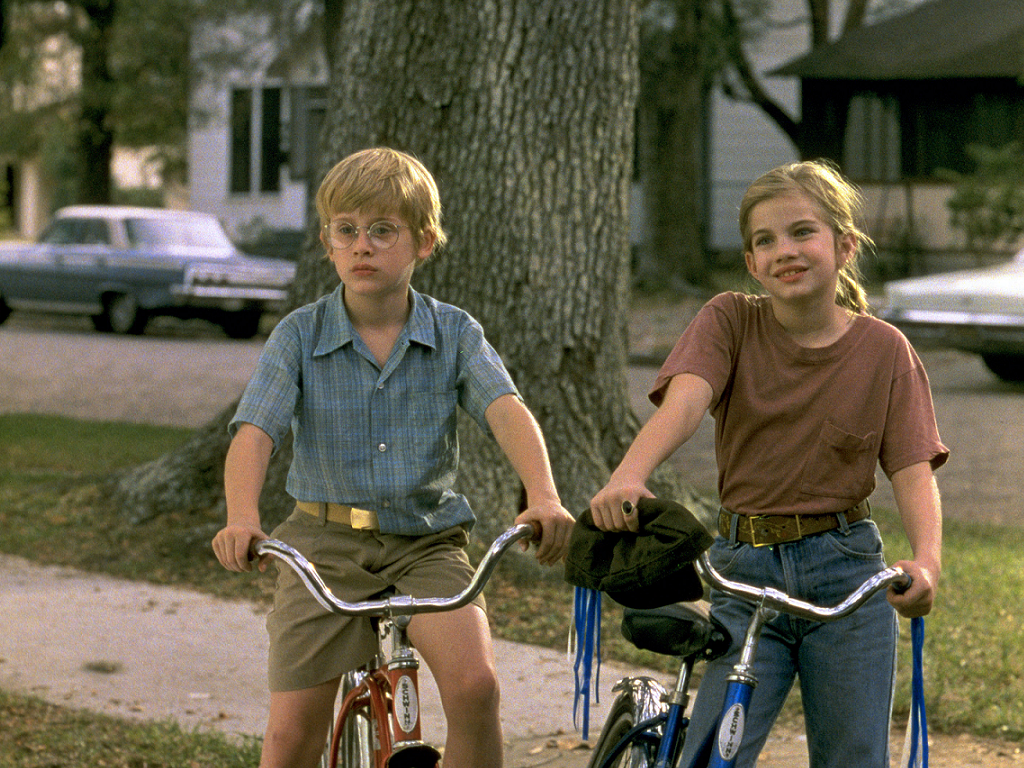1991 102 minutes. Rated PG.
“You forgot about the time I wanted to be a magician. I was really great at making myself disappear.”

My Girl – Columbia
Tomboy Veda Sultenfuss has a problem. In fact, she’s convinced she’s dying.
According to her, she has a chicken bone stuck in her throat and it’s slowly killing her. Remember when you were in elementary school and certain movies and music were considered “cool” (in 1991, R.E.M., MTV, Wayne’s World, Terminator 2)? Well, My Girl was definitely a popular flick any self-respecting eleven year old girl had to see, in the theater no less. I think there’s still a little witty Veda that comprises my inner child, and there’s something reassuring about re-watching her explore all of her tough feelings and experiences years later. This movie is a light drama, an early nineties coming-of-age story encompassing both humor and sadness.
After Veda’s mother passed away (a few days post delivery), her mortician father, Harry Sultenfuss (Dan Ackroyd), raises her as a single dad in the funeral home, where his dementia bound mother, “Gramoo” (Ann Nelson), lives in a catatonic state–yet manages a couple of comical swan-songs (particularly one cheeky scene with her crooning “One more For the Road”) when viewers least expect it.
Enter Shelly DeVoto (Jamie Lee Curtis), erroneously believing she is applying for a job as a cosmetologist (for the living), and the dysfunction becomes challenged. Free thinking, smart, attractive, maternal, Shelly notices Veda’s fears of death, and her father’s evasiveness with the living, and tries (much to Veda’s initial distaste) to form a bond with the unit. Thomas J. (played by the flatly precocious and yet undeniably adorable Macauley Culkin) is Veda’s best friend. Allergic to everything, it seems–except Veda–he is the only one who seems to understand her fears, and often accompanies her to the local doctor’s office when her hypochondria calls her to go there.
If you are a girl and you have ever identified yourself as a tomboy, My Girl is one to check out, especially if you are a preteen girl. Though the days of flashlight hide-and-go-seek, bike riding with boys, digging and leaving mud pies in careless heaps in the backyard–much to some poor parent’s annoyance–are long gone for most of us, there is something about the Veda character that makes me vividly reminisce on those experiences, and still long for the simple pleasure of this outdoorsy fun.
Besides the nostalgia it brings viewers and its charming, realistic tone, My Girl presents both kids’ and parents’ challenges in coping with death and loss. Mostly avoiding the topic, Veda’s father spends less time on his living daughter, neglects his own needs, and seems to dwell in his role as solemn undertaker to a point where he loses touch. When Shelly arrives, this is called out, and gradually (and tragically), both characters are able to find each other, communicate about the loss of Veda’s mother, and thrive again.
Phil (Richard Masur) is a welcomed avuncular comic relief as Harry’s brother, and offers reassurance to an initially threatened Veda about the budding relationship between Shelly and the long out-of-touch Harry. More emotional awakening comes in the relationship (infatuation) Veda has with her local creative writing teacher, Mr Bixler (Griffin Dunne).
Honestly, this movie is pretty depressing, and darker than I had first remembered. Also, though entertaining, the sentimental tone at times feels out of sync with the playfulness of the rest of it. For example, Veda’s sassy quips, the hokey dementia-ridden Gramoo character, who suddenly busts out with tunes during random funeral/dinners, paired with all the death and loss. Also, would the free-spirited Shelly really be THAT excited to work with the local mortician when she learns (she didn’t read the job ad???) she’ll be putting makeup on dead folks; and fall for Harry (who hasn’t dated since pre-sexual revolution days)? The film has her living in her camper that was once co-owned by her ex Ralph (Ray Buktenica), who pays her a sneaky visit, causing the normally placid Harry to puff up and order him to buzz off…or else! Though an amusing subplot, it was one of many that never felt quite believable, though I enjoyed buying into it.
Like most people in life, Veda goes through the typical crescendos of feelings in navigating her emotional awakening. This is no easy feat in the midst of her mother’s death and her father’s forced role into single parenthood. Initially confused and unable to communicate this to her father, Veda feels overlooked and responds to her own vulnerability by acting evasive and sharp-tongued. Eventually, Veda comes to understand that her mother’s death (and some other painful events) have nothing to do with her. She then is able to reconnect with Harry, form a bond with Shelly, and shed her fears and develop into a young lady. In short, she begins to understand loss and pain, which is pretty heavy stuff for an eleven-year-old.
Watch alike: Try, the wonderfully cast tearjerker Man in the Moon starring Reese Witherspoon (also early nineties!).
